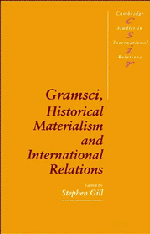Book contents
- Frontmatter
- Contents
- Notes on contributors
- Acknowledgements
- Gramsci and global politics: towards a post-hegemonic research agenda
- PART I PHILOSOPHICAL AND THEORETICAL REFLECTIONS
- PART II PAST, PRESENT AND FUTURE
- 5 Gramsci and international relations: a general perspective with examples from recent US policy toward the Third World
- 6 The three hegemonies of historical capitalism
- 7 The hegemonic transition in East Asia: a historical perspective
- 8 Intemationalisation and democratisation: Southern Europe, Latin America and the world economic Crisis
- 9 Soviet socialism and passive revolution
- 10 Structural issues of global governance: implications for Europe
- References
- Index
- Titles in the series
9 - Soviet socialism and passive revolution
Published online by Cambridge University Press: 10 January 2011
- Frontmatter
- Contents
- Notes on contributors
- Acknowledgements
- Gramsci and global politics: towards a post-hegemonic research agenda
- PART I PHILOSOPHICAL AND THEORETICAL REFLECTIONS
- PART II PAST, PRESENT AND FUTURE
- 5 Gramsci and international relations: a general perspective with examples from recent US policy toward the Third World
- 6 The three hegemonies of historical capitalism
- 7 The hegemonic transition in East Asia: a historical perspective
- 8 Intemationalisation and democratisation: Southern Europe, Latin America and the world economic Crisis
- 9 Soviet socialism and passive revolution
- 10 Structural issues of global governance: implications for Europe
- References
- Index
- Titles in the series
Summary
The thesis of this chapter is that the demise of Soviet socialism and the collapse of the USSR have to be interpreted in terms of a transition of one particular state/society configuration to another. The passing of a Hobbesian Leviathan rather than a crisis of socialism as much marks its dénouement. Meanwhile, it is not only Gramsci's notes on the importance of civil society as a sphere separate from formal state power that warrants a reference to the author of the Prison Notebooks in this connection. Gramsci also sketched a theory of ‘molecular’ class formation governed by the relations between different types of state which is particularly relevant in the Soviet case.
We will first briefly outline this theory and then interpret the various phases of the USSR's history in light of it, up to the Yanayev coup attempt of August 1991, the moment which catalysed the final dissolution of the USSR.
PASSIVE REVOLUTION AND INTERNATIONAL RELATIONS
We proceed from the premise that international relations are an aspect of global social development, in which states function to articulate the conditions of social production and power between rulers and ruled, and between states as such. As each political unit combines within itself a historically concrete array of social forces, reflecting the unequal development of different fragements of an immanent world society, state formation and international relations reflect the friction on the road to global integration in a most acute way, as war linked to social revolution (Rosenstock-Huessy, 1961).
- Type
- Chapter
- Information
- Gramsci, Historical Materialism and International Relations , pp. 237 - 258Publisher: Cambridge University PressPrint publication year: 1993
- 15
- Cited by

